

Ben Goertzel, PhD. Ben Goertzel in HK - The Singularity 101. Ray Kurzweil: A university for the coming singularity. Singularity University. Singularity Summit at Stanford. An Annual Conference onScience, Technology, and the Future The Singularity Summit is an annual conference on science, technology, and the future co-produced by MIRI and Singularity University.
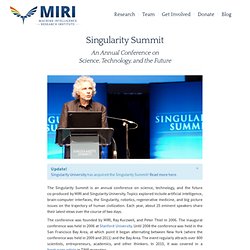
Topics explored include artificial intelligence, brain-computer interfaces, the Singularity, robotics, regenerative medicine, and big picture issues on the trajectory of human civilization. Each year, about 25 eminent speakers share their latest views over the course of two days. The conference was founded by MIRI, Ray Kurzweil, and Peter Thiel in 2006. The inaugural conference was held in 2006 at Stanford University. Summit 2012 Summit 2011 Summit 2010 Summit 2009 Summit 2008 Summit 2007 Summit 2006. Singularitysummit. Singularity Network. Singularity Hypotheses: A Scientific and Philosophical Assessment. Singularity Hypotheses: A Scientific and Philosophical Assessment. What is the Singularity?
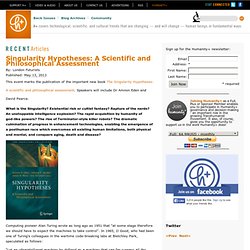
Existential risk or cultist fantasy? Rapture of the nerds? An unstoppable intelligence explosion? The rapid acquisition by humanity of god-like powers? The rise of Terminator-style killer robots? Computing pioneer Alan Turing wrote as long ago as 1951 that "at some stage therefore we should have to expect the machines to take control". “Let an ultraintelligent machine be defined as a machine that can far surpass all the intellectual activities of any man however clever. Since that time, the notions of 'intelligent explosion' and 'technology singularity' have increasingly passed into the public awareness. But are any of the accounts of the technological singularity credible? A new book, "Singularity Hypotheses: A Scientific and Philosophical Assessment", is about to be published, that gathers the latest thinking about the singularity from a who's who of deep thinkers.
About Dr Amnon Eden: Dr Eden's publications include: About David Pearce: Eliezer S. Yudkowsky. Eliezer Yudkowsky on Intelligence Explosion. Three Major Singularity Schools : The Singularity Institute Blog. I’ve noticed that Singularity discussions seem to be splitting up into three major schools of thought: Accelerating Change, the Event Horizon, and the Intelligence Explosion.
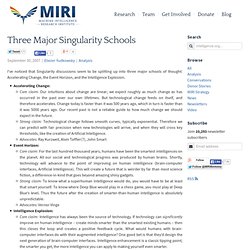
Accelerating Change:Core claim: Our intuitions about change are linear; we expect roughly as much change as has occurred in the past over our own lifetimes. But technological change feeds on itself, and therefore accelerates. Change today is faster than it was 500 years ago, which in turn is faster than it was 5000 years ago. Our recent past is not a reliable guide to how much change we should expect in the future.Strong claim: Technological change follows smooth curves, typically exponential. Therefore we can predict with fair precision when new technologies will arrive, and when they will cross key thresholds, like the creation of Artificial Intelligence.Advocates: Ray Kurzweil, Alvin Toffler(?) Nick Bostrom's Home Page. The Coming Technological Singularity. ==================================================================== The Coming Technological Singularity: How to Survive in the Post-Human Era Vernor Vinge Department of Mathematical Sciences San Diego State University (c) 1993 by Vernor Vinge (Verbatim copying/translation and distribution of this entire article is permitted in any medium, provided this notice is preserved.)
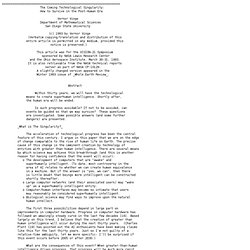
This article was for the VISION-21 Symposium sponsored by NASA Lewis Research Center and the Ohio Aerospace Institute, March 30-31, 1993. It is also retrievable from the NASA technical reports server as part of NASA CP-10129. A slightly changed version appeared in the Winter 1993 issue of _Whole Earth Review_. Abstract Within thirty years, we will have the technological means to create superhuman intelligence. Alvin Toffler. Alvin Toffler (born October 4, 1928) is an American writer and futurist, known for his works discussing the digital revolution, communication revolution and technological singularity.
He founded Toffler Associates, a management consulting company, and was a visiting scholar at the Russell Sage Foundation, visiting professor at Cornell University, faculty member of the New School for Social Research, a White House correspondent, an editor of Fortune magazine, and a business consultant.[3] Toffler is married to Heidi Toffler, also a writer and futurist. They live in the Bel Air section of Los Angeles, California, just north of Sunset Boulevard. The couple’s only child, Karen Toffler, (1954–2000), died at the age of 46 after more than a decade suffering from Guillain–Barré syndrome.[4][5] Early life and career[edit] Alvin Toffler was born in New York city in 1928.
In the mid-’60s, the Tofflers began work on what would later become Future Shock.[6] His ideas[edit] Critical acclaim[edit] Vernor Vinge on the Singularity. Vernor Vinge Department of Mathematical Sciences San Diego State University (c) 1993 by Vernor Vinge (This article may be reproduced for noncommercial purposes if it is copied in its entirety, including this notice.)
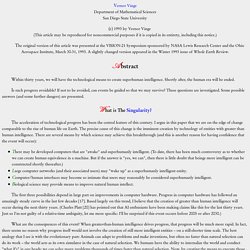
The original version of this article was presented at the VISION-21 Symposium sponsored by NASA Lewis Research Center and the Ohio Aerospace Institute, March 30-31, 1993. A slightly changed version appeared in the Winter 1993 issue of Whole Earth Review. Within thirty years, we will have the technological means to create superhuman intelligence. Shortly after, the human era will be ended. Is such progress avoidable?